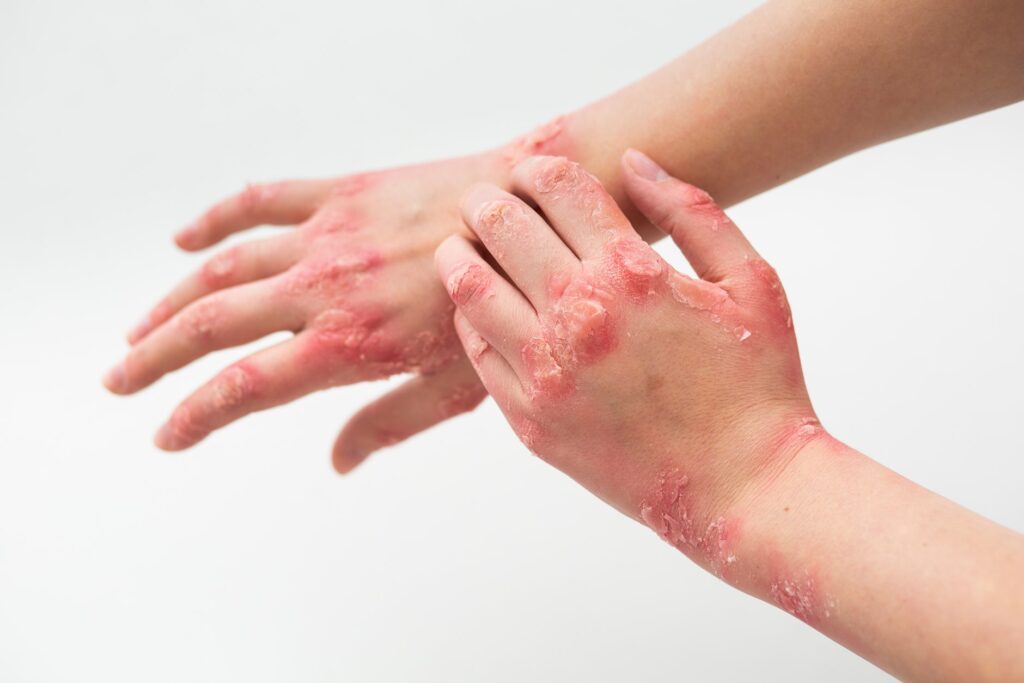What Is Psoriasis?
Psoriasis is a long-term skin condition. It causes red, scaly patches on the skin. These patches can be itchy or sore. Anyone can get psoriasis, but it is not contagious. Although the exact cause is unknown, the immune system plays a big role. Understanding what triggers psoriasis can help you manage flare-ups and reduce symptoms.
Why Do Psoriasis Flare-Ups Happen?
Psoriasis flare-ups happen when something triggers the immune system. As a result, the skin cells grow too quickly. This leads to thick, red, and flaky patches. While some triggers are common, each person may react to different things. Knowing what triggers psoriasis for you can help you avoid flare-ups.
Most Common Psoriasis Triggers
Many things can cause a psoriasis flare-up. Below are the most common triggers:
Stress
Stress is a top trigger for many people with psoriasis. When you feel stressed, your body releases chemicals that can make symptoms worse. For example, work pressure or family worries can lead to a flare-up.
Skin Injuries
Even small injuries can trigger psoriasis. This includes cuts, scrapes, sunburn, or bug bites. Sometimes, a new patch of psoriasis appears where the skin was hurt. This is called the Koebner phenomenon.
Infections
Some infections can cause psoriasis to flare. For instance, strep throat is a common trigger, especially in children. Other infections, like colds or the flu, can also make symptoms worse.
Weather Changes
Weather can affect your skin. Cold, dry air often makes psoriasis worse. On the other hand, warm and sunny weather may help some people. However, too much sun can cause sunburn, which is also a trigger.
Certain Medications
Some medicines can trigger or worsen psoriasis. These include:Beta-blockers (used for heart problems)Lithium (used for mental health)Some anti-malarial drugsNon-steroidal anti-inflammatory drugs (NSAIDs)
If you think a medicine is causing a flare-up, talk to your doctor before stopping it.
Lifestyle Factors
Your daily habits can also play a role. For example, smoking and drinking alcohol can make psoriasis worse. Poor sleep and unhealthy eating may also trigger symptoms.
How to Identify and Manage Your Triggers
It is important to know what causes your psoriasis to flare. Here are some steps you can take:Keep a diary of your symptoms and daily activitiesNote when flare-ups happen and what you were doingShare this information with your doctorWatch for patterns, such as stress or certain foods
Once you know your triggers, you can take steps to avoid them. For example, if stress is a trigger, try relaxation techniques. If certain medicines cause flares, ask your doctor about other options.
Prevention Tips and Lifestyle Guidance
Although you cannot cure psoriasis, you can reduce flare-ups. Try these tips to help manage your symptoms:Moisturize your skin daily to prevent drynessUse gentle soaps and avoid harsh chemicalsProtect your skin from cuts and sunburnManage stress with exercise, meditation, or hobbiesEat a balanced diet rich in fruits and vegetablesAvoid smoking and limit alcoholFollow your treatment plan as advised by your doctor
In some places, climate can affect your skin. For example, people living in cold or dry areas may need extra care during winter.
Conclusion
Psoriasis triggers can vary from person to person. However, knowing what causes your flare-ups can help you manage the condition. If you need help, consult a dermatologist for personalized advice on managing psoriasis triggers.

